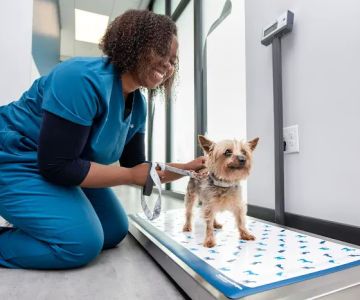Can a Veterinary Technician Work at a Zoo? Exploring Careers in Zoo Veterinary Medicine
1. What Does a Veterinary Technician Do at a Zoo?
If you're someone like me, who has always been fascinated by animals and wanted to work closely with them in a medical capacity, you may have wondered, “Can a veterinary technician work at a zoo?” After working as a veterinary technician in various settings, I can confidently say that zoo veterinary technicians play a crucial role in the healthcare of exotic and wild animals.
Veterinary technicians at zoos work alongside veterinarians to ensure the health and well-being of animals, ranging from lions and tigers to monkeys and birds. Their duties include assisting in medical procedures, administering medications, monitoring anesthesia, collecting lab samples, and even helping with animal surgeries. The primary difference between working in a traditional veterinary clinic and a zoo is the species of animals you work with, as well as the unique challenges posed by wildlife.
2. The Unique Skills Required for a Veterinary Technician at a Zoo
Working as a veterinary technician at a zoo requires a specialized skill set. In addition to the core veterinary technician skills like administering medications and performing diagnostic tests, zoo vet techs need a deep understanding of animal behavior, as many of the animals are wild or semi-wild and may behave unpredictably. For instance, during my time at a wildlife rehabilitation center, I had to quickly adapt to working with animals that weren’t accustomed to human interaction. It was both thrilling and challenging, as every animal has its own unique set of needs.
Another important skill is knowledge of exotic animal anatomy and physiology. A veterinary technician working at a zoo needs to understand the biology of different species, from the smallest reptiles to the largest mammals. Their medical training goes beyond that of a typical vet tech, as they must be prepared to handle the specific health issues that arise in zoo animals, such as stress-related illnesses or injuries due to their environment.
3. Why You Might Want to Work as a Veterinary Technician at a Zoo
Working at a zoo as a veterinary technician can be an incredibly rewarding career. For many of us who dream of being around exotic animals on a daily basis, this career allows you to combine your passion for wildlife with your skills in animal care. The unique aspect of zoo medicine is that you get to work with a diverse range of animals that you wouldn't typically encounter in a private clinic, such as giraffes, elephants, or even endangered species.
I remember visiting a zoo with a friend who worked there as a vet tech, and she shared with me the most amazing stories about caring for a baby rhino and helping a parrot recover from an injury. What really struck me was the sense of fulfillment she felt knowing that her work directly contributed to the conservation of these species. Zoos often have educational programs and conservation efforts, meaning your work can contribute to preserving wildlife and educating the public about animal care.
4. Challenges Faced by Veterinary Technicians Working at Zoos
While the idea of working as a veterinary technician at a zoo sounds exciting, it’s also important to acknowledge the challenges that come with it. For example, unlike a traditional clinic where the animals are generally accustomed to human handling, zoo animals can be unpredictable and may require special techniques to safely handle them. This requires patience, careful observation, and a deep understanding of animal behavior.
Another challenge is the physical demands of the job. Working in a zoo often means dealing with large, heavy animals or animals that need special care, such as those in rehabilitation programs. Additionally, a zoo environment can be less controlled than a veterinary clinic, with animals living in outdoor enclosures and various habitats, which sometimes complicates healthcare procedures.
From my own experiences, I’ve learned that working at a zoo requires a high level of adaptability and problem-solving. You’re often required to come up with creative solutions for unexpected situations, like managing animals with complex medical histories or performing medical procedures in less-than-ideal conditions. But despite these challenges, the opportunity to contribute to animal care in such a dynamic and impactful setting can be extremely rewarding.
5. Steps to Becoming a Veterinary Technician at a Zoo
If you’re interested in pursuing a career as a veterinary technician at a zoo, there are several steps you’ll need to take. First, like any other veterinary technician role, you need to complete an accredited veterinary technology program, which typically takes two years. These programs include both coursework and hands-on clinical training, preparing you for the technical aspects of the job.
Once you graduate, obtaining certification as a veterinary technician (depending on your state) is often required. This certification ensures you are recognized as a professional in the field and allows you to practice veterinary technology legally.
However, to work specifically at a zoo, gaining experience with exotic animals is essential. Many zoos require veterinary technicians to have experience working with wildlife or in zoo medicine, so internships or volunteer opportunities at wildlife rehabilitation centers or zoos can provide valuable experience. I’ve heard stories from colleagues who started their careers in wildlife sanctuaries before securing a position at a zoo, and this hands-on experience made all the difference in their applications.
Networking is also crucial. Attending conferences, joining professional organizations like the American Association of Zoo Veterinarians, and building relationships with professionals in the field can open doors to job opportunities and help you stay updated on the latest trends in zoo veterinary care.
6. The Future of Veterinary Technicians in Zoos
The demand for veterinary technicians in zoos is expected to grow as more zoos focus on conservation, education, and providing top-tier medical care for the animals in their care. As zoos evolve to offer better habitats and more specialized care, the need for skilled veterinary technicians who can manage the health of a wide range of species will become even more critical.
With the advancement of technology and more focus on animal conservation, zoo veterinary technicians will continue to play a pivotal role in ensuring that animals receive the best care possible. From assisting with advanced diagnostic procedures to managing medical records and helping with breeding programs, the future looks promising for those who pursue this unique and rewarding career.











